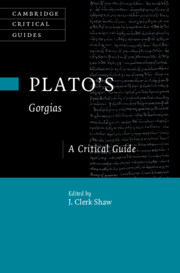Book contents
- Plato’s Gorgias
- Cambridge Critical Guides
- Plato’s Gorgias
- Copyright page
- Contents
- Contributors
- Abbreviations
- Introduction
- Chapter 1 Gorgias of Leontini and Plato’s Gorgias
- Chapter 2 Ancient Readers of the Gorgias
- Chapter 3 Philosophy and the Just Life in the Gorgias
- Chapter 4 Socrates and Coherent Desire (Gorgias 466a–468e)
- Chapter 5 The Ethical Function of the Gorgias’ Concluding Myth
- Chapter 6 Shame in the Gorgias
- Chapter 7 Desire and Argument in Plato’s Gorgias
- Chapter 8 Cooperation and the Search for Truth
- Chapter 9 Freedom, Pleonexia, and Persuasion in Plato’s Gorgias
- Chapter 10 Revealing Commitments
- Bibliography
- Index
- Cambridge Critical Guides
Chapter 2 - Ancient Readers of the Gorgias
Published online by Cambridge University Press: 25 May 2024
- Plato’s Gorgias
- Cambridge Critical Guides
- Plato’s Gorgias
- Copyright page
- Contents
- Contributors
- Abbreviations
- Introduction
- Chapter 1 Gorgias of Leontini and Plato’s Gorgias
- Chapter 2 Ancient Readers of the Gorgias
- Chapter 3 Philosophy and the Just Life in the Gorgias
- Chapter 4 Socrates and Coherent Desire (Gorgias 466a–468e)
- Chapter 5 The Ethical Function of the Gorgias’ Concluding Myth
- Chapter 6 Shame in the Gorgias
- Chapter 7 Desire and Argument in Plato’s Gorgias
- Chapter 8 Cooperation and the Search for Truth
- Chapter 9 Freedom, Pleonexia, and Persuasion in Plato’s Gorgias
- Chapter 10 Revealing Commitments
- Bibliography
- Index
- Cambridge Critical Guides
Summary
This chapter looks at approximately a millennium of ancient reception, from factors pertaining to the writing and early circulation of Gorgias to the commentary on the work by Olympiodorus in the sixth century of our era. The dialogue was not written for light-hearted entertainment but as a vehicle for serious philosophy. Early readers must have included Plato’s rival Isocrates, whose Against the Sophists criticizes material early in the work, while inspiring 519b-d. Aristotle made extensive use of it in the Rhetoric, but may have thought its ethics superceded. A range of allusions in the spurious Alcibiades II strongly suggests that Gorgias was well-known by the late fourth century. It was widely read thereafter, thanks to rhetoricians and grammarians. Commentaries emerged from the Platonist schools, from Taurus to Olympiodorus, and may be supplemented from other philosophic discussion. Dodds had a low regard for Olympiodorus, taking little account of the task faced by the Alexandrian commentator. Some examples show how this view caused him to overlook places where Olympiodorus’ offers assistance, or even to misreport what he says. I conclude with the value of studying the ancient reception for enhancing our view of Plato.
- Type
- Chapter
- Information
- Plato's GorgiasA Critical Guide, pp. 27 - 47Publisher: Cambridge University PressPrint publication year: 2024

